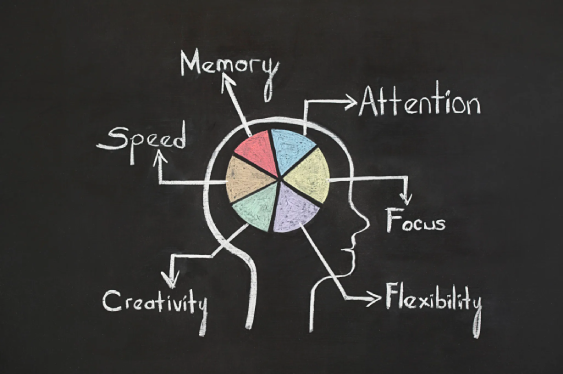- February 12, 2024
- Editorial Team
- Comment: 0
- Blog
Brain Health: 5 Tips to Improve Memory and Cognitive Function
Our brains are incredibly complex organs that allow us to learn, remember, problem-solve, and experience emotions. As we age, it’s normal for our brain health and cognitive functions like memory, processing speed, and focus to decline slightly. However, research shows there are many lifestyle changes and brain exercises you can do to keep your mind sharp.
Moreover, in this competitive world, maintaining optimal brain health is crucial for overall productivity. In our daily lives, the role of cognitive abilities, including memory, attention, and problem-solving skills, are highly influential. Also, the human brain is a marvel and has an astonishing ability to adapt and change. This marvellous ability is known as neuroplasticity. We can train our brains with proper stimulation, form new neural pathways, and alter existing connections.
In this blog post, we’ll explore five science-backed strategies for boosting brain health and improving memory and cognition at any age. Implementing even a few of these simple tips into your routine can pay dividends when it comes to your overall mental acuity.
Best 5 Tips to Improve Memory and Cognitive Function
Exercise More for Better Brain Health
Exercise has been shown to benefit brain structure and function. Aerobic exercise like walking, cycling, or light jogging 3-4 times per week for 30-40 minutes promotes the growth of new brain cells in areas involved in memory and learning. Exercise also increases blood and oxygen flow to the brain to nourish mind cells.
Adding physical activity to your normal routine can translate to tangible cognitive gains. Even light workouts can improve focus, decision-making, and ability to process information. Exercise helps the brain form new neuron connections faster to boost cognitive horsepower.
Follow a Healthy, Balanced Diet
Eating well provides essential nutrients that fuel your mind cells and protect brain health over time. The Mediterranean and DASH diets emphasize vegetables, berries, whole grains, nuts, fish, poultry, beans and healthy oils like olive oil. These diets are linked with better cognitive performance and lowered risk of dementia.
Berries are potent sources of flavonoids and polyphenols that safeguard neurons from oxidative damage. Fatty fish like salmon provide anti-inflammatory omega-3s to support optimal brain function. Complex carbs give you sustained energy while nuts and seeds deliver protein and brain-protective vitamin E.
Aim for colourful, minimally processed whole foods over heavy meals – nourish your neurons adequately to boost retention and recall.
Train Your Brain with Cognitive Challenges
The adage “use it or lose it” applies to our cerebral health. Stretching your thinking capacity with brain-stimulating games and tasks enables more cognitive stamina and flexibility to handle life’s demands.
Memorise poems or speeches, learn a musical instrument, read books on unfamiliar topics, and take alternate routes when driving – these activities all fire and wire together networks of neurons in novel ways—mastering new skills forces brain cells to sprout more connections for faster thinking ability.
Break out of routine mental habits to reap noticeable rewards in job performance, quicker thinking and youthful vitality to handle all you encounter. Make brain-training exercises part of your weekly schedule.
Prioritise High-Quality Sleep
Skimping on sufficient slumber sabotages cognitive ability and concentration. While asleep, our hippocampus replays memories to reinforce learning. Our glymphatic system also clears away metabolic debris that dulls mental function when awake. Getting quality sleep refreshes your neural connections to awaken with sharper recall and a richer readiness to learn.
Adults need 7-9 hours nightly, leveraging melatonin production in the dark. Establish a consistent pre-bedtime routine, limiting electronics and caffeine late in the day. Set yourself up for deeper sleep by keeping your room cool, dark and quiet. Rise and go to bed around the same times daily to stabilize circadian rhythms for ideal sleep-wake cycles and improved brain performance.
Manage Stress Levels with Mindfulness
Unmanaged worry and anxiety often manifest as “brain fog”, racing thoughts and forgetfulness. Stress hormones like cortisol can impair communication between brain cells and damage their structure in the hippocampus. Practising mindfulness meditation creates brain changes that offset the harmful effects of chronic stress for sharper mental skills.
Just 5-10 minutes daily of focusing your attention intentionally on the present moment while directing feelings of warmth and compassion towards your experience can work magic. Mindfulness practice strengthens neural connections in cortical areas that govern executive function, attentional control and emotion regulation among veterans and neurosurgery patients. Less stress boosts creativity, reasoning and emotional resilience to flex your cognition.
Conclusion
Supporting whole-body health with smart lifestyle choices preserves the intricate neural wiring we rely on to navigate life’s complexities at any age. Follow these five tips – exercise often, eat a balanced diet low on sugar, challenge your brain routinely, prioritize sleep quality and manage stress mindfully – for gains in memory, focus, processing speed and mental acuity. Invest in your brain health now and your mind will stay keener for years to come.
If you want to take proactive steps to improve your brain health, cognitive function and memory, consult with the neuro specialist doctors at Dispur Polyclinic and Hospitals. Their team of seasoned medical professionals and therapists offer cutting-edge assessments to evaluate your current brain health and create customized treatment plans.
Dispur Polyclinic’s holistic, integrated care pairs advanced treatments with lifestyle counselling for optimal mind-body wellness.
Visit Dispur Polyclinic and Hospitals or book an appointment online today to meet with their compassionate providers. Invest in your brain health now for a brighter, more engaged tomorrow!


Leave feedback about this